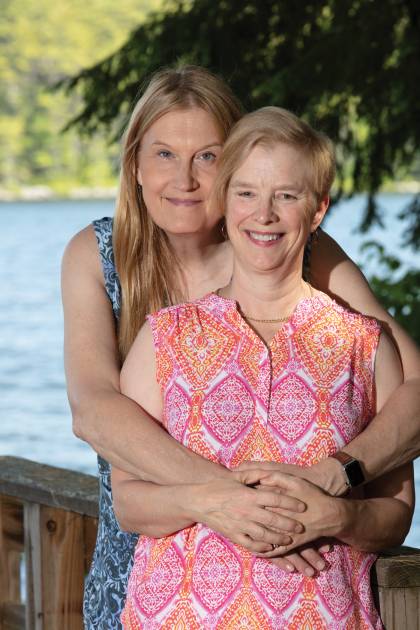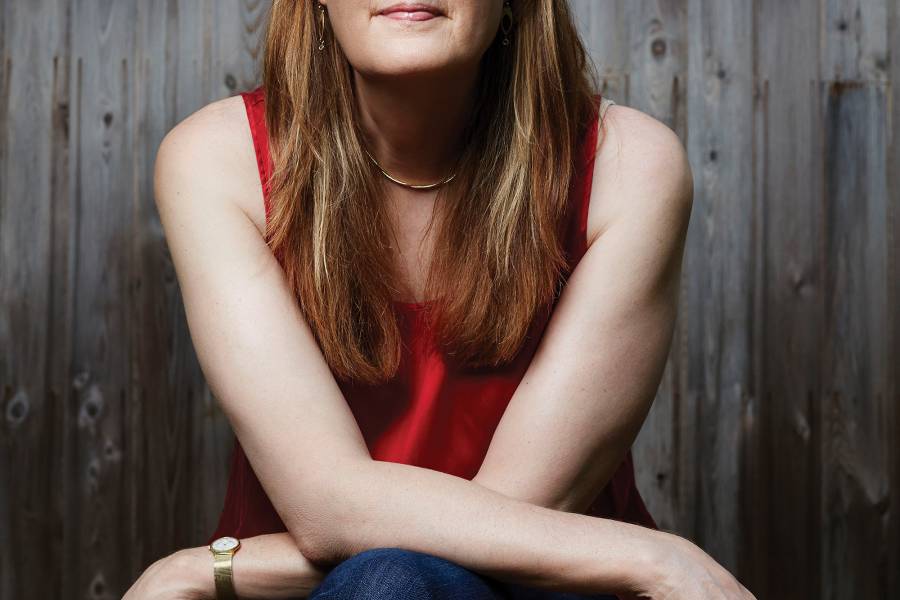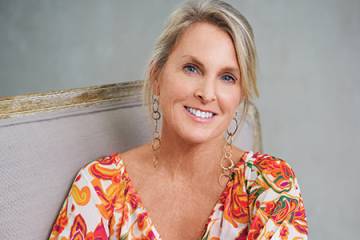The writer Jennifer Finney Boylan sits behind her home office desk, half in light, half in darkness. "How appropriate," she deadpans. Our video call in early fall begins with a blip of a technical snafu, and when her image finally appears on screen, she fusses with her hair and straightens her glasses, using monitor as mirror.
"I look like somebody's grandmother," she says with a smirk, before leaning back. "Oh well. So, what's happening? You in Baltimore?" I am. Boylan is in Belgrade Lakes, Maine, which I can glean from the sliver of water and tall evergreens that peak through the window on her left. She lives here two-thirds of the year with her wife of 32 years, Deirdre ("Deedie"). They have two grown children: Sean, 24, and Zai, 26.
In another universe, Jenny and I might have met in New York City, her home each spring. She teaches creative writing as the inaugural Anna Quindlen Writer-in-Residence at Barnard College of Columbia University. A novelist, memoirist, and short story writer, Boylan, A&S '86 (MA), also might have, under different circumstances, been in book tour mode this year to promote her latest work, the memoir Good Boy: My Life in Seven Dogs (Celadon Books, April 2020).
Instead, we meet at our home desks. At Boylan's, she pens her biweekly opinion column for The New York Times and has authored the last eight of her 16 books. Her latest project is a novel she's writing with bestselling author Jodi Picoult, due out in fall 2022.
Most of Good Boy fittingly takes place in Boylan's homes, beginning with her upbringing in a suburb of Philadelphia with her father, J. Richard Boylan, A&S '50, a banker and former Johns Hopkins University trustee; mother, Hildegarde Boylan; and sister, Cynthia.
Jennifer Finney Boylan spent the first four decades of her life known as James "Jim" Boylan. She and Deirdre spent a dozen years as husband and wife, and past 20 as wife and wife. Boylan, a transgender activist and infrequent reality TV star, openly chronicled her life's journey in the landmark 2003 memoir She's Not There: A Life in Two Genders (Broadway Paperbacks/Crown Publishing). The book became a bestseller, jump-started the trans literary canon, and thrust her into celebrity status. In the coming decade, she would appear on The Oprah Winfrey Show on four occasions, Larry King Live twice, the Today show, The Barbara Walters Special, and NPR's Marketplace and Talk of the Nation. She has also been the subject of documentaries on CBS News' 48 Hours and the History Channel. She was a regular on I Am Cait, a 2015–16 spinoff of Keeping Up With the Kardashians, starring her friend Caitlyn Jenner.

Nearly 20 years after She's Not There, Boylan, 62, wanted to tell her story again, this time through the prism of seven dogs she's owned: Playboy, Sausage, Brown, Alex, Lucy, Ranger, and Matt the Mutt. Good Boy stems from a 2017 Times article she wrote about the passing of her eighth dog Indigo, a rescued black Lab. While the book doesn't gloss over her gender confirmation surgery at age 42, the pages are mostly about family, relationships, and, obviously, dogs, who taught her about love and were present through her life's many transitions. Animals often take center stage in the book's heartwarming and sometimes heartbreaking scenes, with cats, horses, pigs, and a porcupine given full measure. Her central theme: Animals can see us for who we truly are, the good, the bad, and even our fears.
For her fourth memoir, Boylan says she had more to say about her life and a different perspective to tell it from. I sat down to talk about the book, her writing, Johns Hopkins, dogs, and, rather unexpectedly, getting drunk with Sir Ian McKellen. Let me tell you, Boylan's impression of McKellen is pretty spot on.
Forgive me, but what prompted another memoir, and why now?
It's funny. If you're a novelist, you're allowed to write as many novels as you feel like. It's not like, "Don't you think six novels is quite enough?" As a memoirist, you get, "You told the story of your life, and now you're going to tell it again?" I guess the word memoir makes some feel like you're looking back, like you're Charlton Heston saying, "Let me tell you what it was like making Ben-Hur." It's a memoir, yes, but it's also a book about dogs, and the way dogs teach us how to love. And learning how to love—ourselves and others—is kind of the job we all have.
I thought it was a nice way of grouping seven parts of my life. The other thing was a lot of transgender women don't refer to the first half of their life as boyhood, and I respect that. But I'm OK with doing that. I lived in the world apparently male for 40 years. It wasn't all bad. I was a loved person, and there were a lot of joyful moments in my life. The question I had was: What is it like to be a middle-aged woman, and that might be putting it generously at this point, who had a boyhood? Where is that boy? It was in the love of all these dogs that I was able to reconnect with that crazy young male.
[The book] is also a way to interrogate masculinity, and a spy's view of masculinity seemed a story worth telling. My relationship with dogs, and my father's relationship with dogs, seemed like a good telescope to look through. So it's also a book about men. For some, men in particular, expressing love is not something they're good at. We always knew my father loved us. He was a reserved, lovely man, a Don Draper kind of guy, but he couldn't talk about love. But he was unabashed about his love when it came to a dog. He would get down on the floor and wrestle with Playboy and our other dogs, too. For a lot of men, there is a "Get out of jail free card" when it comes to expressing the love that's in their heart for dogs. It enables us to see what is hidden. And if there is anybody who knows something about what it's like to be a man with something hidden, it's me.
You cover a lot of emotional ground here. Losing your father at age 57 to cancer. There's a scene where your sister's horse gets hit by a car and dies. The lives and deaths of all these animals you loved. Were there many tears on these pages?
This was a hard book to write. Family, of course. And that's the thing about dogs. It's not a love that's going to last forever. You get 12 years, maybe a few more if you're lucky. In a way, it's a small model for the process we all go through. To love someone, or to love something, also means you're going to have your heart broken sooner or later because nothing, certainly not ourselves, lasts forever. The column I wrote for the Times when my dog Indigo died, that opening part of the book, struck a nerve and went viral. I thought, wow, there is something there. I just loved that dog. To be loved is also to experience loss, and all that is worth writing about.
The book contains so many vivid scenes of your youth with complete lines of dialogue between you and your family, friends, neighbors. I've always wanted to ask this of a memoirist: How does one recapture, so perfectly, a conversation one has at age 8 with their sister?
I think writing a literary memoir is like signing onto an agreement with your reader. If you're a writer like me, you're going to tell a story that is true. But sometimes it can take as much imagination to tell the truth as it does to invent something out of whole cloth. The agreement you're making with your reader is this: I'm going to invent dialogue when I can't remember what was said, but when I do, I'm going to invent along the lines of what I imagined to be true to the best of my ability all these years later. I'm not going to lie to you.

To write a memoir, to me, is not the same as taking a photograph. You're making an impression. The relationship between the reality and the story in the book is an invented one, but invented along the lines of revealing a deeper truth.
You dedicated the book to Zai, who came out as trans to you and Deirdre at Thanksgiving dinner a few years ago. What did the dedication mean for both of you?
Well, the final chapter details Zai's transition, and my initial struggles with it, so it felt appropriate to give her the gift of the dedication, which was, of course, meant as a gift of love.
How we're meeting is not ideal. This past year has been a test of wills. How has 2020—and perhaps the past four years—changed you, if at all?
I'm a pretty fierce person. When I wrote my first memoir She's Not There in 2003, my one and only bestseller, I had no sense that the book was going to do anything. I didn't know if anyone would ever read it. I had an idea the publisher had the same doubt. Transgender stuff was really off the radar then, and I wasn't sure who I was writing for. But then the book came out and it was a hit, and I was on Oprah and all that. For about the next half a dozen years I was probably the best known transgender person in the country. Right up until Janet Mock and Laverne Cox took on that mantle.
Originally, I thought, I'm just a writer. I'm not an activist. I thought an activist was someone who chained themselves to a fence or went on a hunger strike or something. It turns out being a writer is a great way to be an activist and to change the world. I stayed on the trans front for these last nearly 20 years because these stories needed to be told.
Now the world has really changed yet again. I'm 62. I came out as trans over 20 years ago. So it's really like a third of my life spent as a woman, at least visibly to other people. I've seen over the past 20 years really different phases of where we are in terms of the movement, and where we are right now is I feel beaten down, discouraged, and blue. It doesn't mean I'm giving up. I'm absolutely determined to keep fighting this fight. But the country seems to be getting dumber and meaner, and it makes me tired. On the other hand, I sit down at my desk and every two weeks I write my column for The New York Times. Every three years or so I publish a book. And that is what I can do, and I'm going to keep on doing it as long as I can.
In the book, you gloss over your life as a writer. One day you pop up as the editor of The Wesleyan Argus, then you're a temp for The New York Post, and eventually you become an in-demand freelancer. Where did the thought of becoming a writer come from?
I think I was hard-wired for writing. But there is a difference between wanting to be a writer and knowing what that means. Unfortunately, the desire itself is not enough to make you good at anything. As you know, there is a lot of trial and error in writing. My friend [Pulitzer Prize–winning novelist] Rick Russo used to say every writer has 1,000 pages of bad fiction in them. And one of the things you have to do is start writing out your 1,000 bad pages.
I did a lot of writing at Wesleyan, and I was encouraged. I wrote plays that were put on that people liked. I wrote a column for the newspaper that people thought was funny. I thought I was going to be a comic writer. The way I dealt with being different and having this unsolvable dilemma in my heart was to generate a lot of malarkey. I worked with a professor of writing, Franklin D. Reeve, the father of actor Christopher Reeve, who saw something serious in me that I didn't see, but he said you have to do the work. I got out of Wesleyan and moved to New York City to become a writer and worked part time at a bookstore. There I worked on a novel and finally finished it, and it was terrible. I wrote another one, and that also was terrible. I did that for six years and then went to Johns Hopkins where John Barth kinda shook me by the collar [laughs].
Tell me about your time here; it's mentioned in the book, but not too much more than the letter you received from John Barth saying you had been accepted into the Writing Seminars—and some dates you went on.
It was what I learned at Johns Hopkins in the Writing Seminars that gave me a career. Up until then I'd been sitting in a little room typing for a decade and coming up with work that wasn't all that great.
When I got to Johns Hopkins, I wanted to be a hippie Russell Baker, a humorist like a James Thurber or Dorothy Parker. What Barth and also Stephen Dixon did was they got me to read other people's work critically and generously, and take myself seriously. What is great about the Writing Seminars is you're working with people who are trying to do what you do, more or less, and you can see where they're messing up. Their characters don't work, or their plots are unbelievable. You see the flaws and the gifts in other writers when you can't see them in yourself. It opens your eyes so you can become a better reader, and then a better writer.
Any secret societies at Johns Hopkins during your time? What was your life like here?
If I was going to tell a story about Johns Hopkins, the first thing I would talk about is my father, who was Class of 1950. He thrived at Johns Hopkins. He was runner-up for a Rhodes Scholarship. He always spoke of Hopkins as a place where, for the first time in his life, the life of the mind was celebrated. As his child, that came to me. We didn't go to Johns Hopkins a lot when I was a kid, but it was always held up to me as that distant shining city on the hill. My father wanted to be a medieval history professor, but there was no money in that. So he went into banking, of all things. When he learned I was going to school here, he did cartwheels.
He became a trustee of the university in the late 1970s and then into the 1980s. Around that time, he had a couple of bouts of melanoma, and the last one carried him off. He came to Johns Hopkins in December of 1985 for a trustees meeting. He took me out to dinner at one of the hotels in the Inner Harbor where he was staying, and that was the last time we went out to dinner together. By the spring, he was gone. In going to Hopkins, in some ways, I felt I was carrying on his legacy.
What was your mindset at that time in your life?

I was a mess by the time I got to Johns Hopkins. I've known I was trans since I was a child, but my sense was I could not come out and live my life as a woman because that was going to guarantee a life of marginality and violence. You will never be loved, never have a family, and nobody will ever hire you for anything, and you'll end up dead. That is what I thought being trans meant. I think the culture, to some degree, reinforced that. Also, it was just too scary, and at the time I was just not a very brave person. So I had two lives. When I was on campus and teaching, there I was, an artistic young man. But I would sneak out at night en femme and prowl the streets of Baltimore, and nobody would know. I can't tell you how terrifying that was. It was like I dressed up as a superhero, but I had no superpowers. I was just someone in a cape.
What influence, if any, did the Writing Seminars have on your approach to teaching?
Back in those days, John Barth taught in the fall and Stephen Dixon taught in the spring. And they had two very different approaches. Barth was the most brilliant, articulate man I've ever met. He would say things like: "Well, I enjoyed the multiplicity of invention, as well as the felicity of your Dickensian narratological gifts. However, would you consider a different turn of events at the midpoint of the second act?" Whereas, with Stephen Dixon there was this heaviness to his spirit, and if you wrote a bad story for him it was like you hurt his feelings. He would say things like: "James, why would you do this?" Like, how could you do this to me? You wanted to please him. Basically, you wanted John Barth to think you were smart and you wanted Stephen Dixon to love you.
There was a third teacher, John Irwin, who just passed away last year. Irwin was a complete eccentric, a brilliant nut. He was writing books on [Edgar Allan] Poe, [Jorge Luis] Borges, Hart Crane, and Wallace Stevens. He would talk for a half hour and you would not know what he was getting at. But he was brilliant and powerful, and as chair of the department, he really lifted me up.
I didn't answer your question. As a young teacher I was able to teach in a very different way than I teach now. I was able to come up with my own classes. One was called Comedy and Horror, which I thought was a nice pairing. Another was—ready, write this down—it was called Metafiction, Modernism, and Irrealism. Ha! It was a crazy, delightful class. I was able to do things as a grad student I would not be able to do once I became an assistant professor, which was to take risks, take chances. I viewed teaching in those days like I was at a Grateful Dead concert or playing in a classic jazz band. We start out playing the main theme, here is the story that we read and some ideas about it. But then we get into the solos. "So, Tim, what do you think about this?" And then I would get people talking, and there would be this crazy jam and I literally would have no idea where the class was going to go. There would be times that class would end up in places that were surprising and exciting. And there were some other times, like a Grateful Dead concert, that the jam led nowhere, it was a dud and boring. And back in those days, with the drinking age 18, I could tell people we're all going to leave and head down to the pub. Of course, that is not the way you can teach a class if you're up for tenure.
You're originally from the Philadelphia area, and perfectly at home in New York City. Tell me about life on the lake in Maine.
It's a good place to write, I can tell you that. Usually, this time of year, I work on a book. And I have my New York Times column. They have given me total freedom to write about anything I want. My official beat is LGBTQ life, as well as politics. But there are times I feel I don't want to be the house queer person. I like to write about families, dogs, pizza. This summer I wrote about the Jersey shore, and one on gin and tonics. Last month, I wrote about LGBTQ politics in this year's election. I wrote about the fate of one-term presidents. I think one of the most popular ones I've ever written is one where I compared Donald Trump to Pepe Le Pew. [Whispers] They both think they're more attractive than they are.

Image caption: Jenny Boylan and wife Deedie at their lake house in Maine
Image credit: Barbara Proud
I'm curious about your phone contact list. Do you ever look at it and think, I can't believe I have this person in my contacts? You've met some famous people over the years.
Caitlyn Jenner calls me every couple of weeks, at least every couple of months. I don't really care about the Kardashians, to be honest. I've had dinner with Kris Jenner. Back before the scandal, my relationship with Jeffrey Tambor meant a lot to me. It still does, it's just a lot more complicated. Jeffrey would thank me in all his acceptance speeches for his Emmys and Golden Globes. I spent a night with Ian McKellen. I never saw anyone drink as hard in my life! Glasses of vodka kept coming every 20 minutes or so with a small orange juice chaser. I tried to keep up, but talk about getting smashed. I remember at one point he only made two sounds, the sort of Gandalf chuckle [mimics chuckle expertly] and the Gandalf pontificating on the bridge, "You shall not pass!" I have a picture of me with him at about 2 in the morning, and it's so blurry, but it's appropriate because we were both blurry at the time.
The biggest rush I ever got was when the phone rang and I heard, "Hello, Jennifer, this is Senator Elizabeth Warren." I was like, "Why, hello senator." She wanted to talk about hearing loss. I write about hearing loss sometimes in the Times. She specifically wanted to talk about the bipartisan low-cost hearing aid bill she and Sen. Charles Grassley had co-sponsored. That was pretty cool.
Back when you were heavily on the talk circuit, did you embrace the role of spokesperson for the trans community, or did you at some point wonder: Why is everyone coming to me? I never asked for this.
It turned out to be a form of activism. The trick is finding out what is appropriate for you. A lot of transgender people want to be famous. Getting yourself onto a crappy talk show is something many people feel they have to do. After you have electrolysis and take hormones, you get yourself in front of a camera, apparently. It's important to learn you're not speaking for everyone because there are so many ways of being trans. And in my experience of being transgender, it doesn't refer to any one thing. There is an old cliché, if you've met one transgender person, you've met—one transgender person.
I like to give people hope—which I sometimes have a hard time finding, too.
On Twitter, you end each day with "Good Night. I love you," accompanied by a campy GIF. That reminds me of one passage in the book I love, and made me cry a little. It's the end of the night, you're in bed with Deedie, and you tell her you don't want this day to end. "Why can't we have one more adventure?"
I just said that to her again last night! "C'mon, more fun." She always gets up before me. She has a standing date with the neighbor to walk the dogs, like 6:30 a.m. or so. They get up and head out on the dirt road here while I catch an extra two hours of sleep. She comes back to bring me coffee in bed. She is in the world two hours before me, and she goes to bed before me. Every day ends like that. And I'm like, "Wait, don't fall asleep, just one more joke, just one more something."
That's a nice way to live and end the day.
I have to tell you. I have a very active dream life. I have very vivid dreams and I try to write them down. Last night, in fact, I dreamed there was a big millipede that somehow developed the ability to disguise itself as an inflatable dog head balloon. Ha! Sometimes I go to bed thinking, let me see what I'm going to come up with this time. I generally like being awake more than being asleep though.
Posted in Arts+Culture, Voices+Opinion, Alumni
Tagged alumni, writing seminars









